Organizational Behaviour at BBC: Culture, Motivation and Team Dynamics
VerifiedAdded on 2024/06/11
|19
|4649
|255
Report
AI Summary
This report provides a comprehensive analysis of organizational behaviour within the BBC, focusing on the cultural changes, the impact of power and politics, and motivational techniques used to improve team effectiveness. It uses Handy's cultural typology to identify the earlier organizational culture within the BBC and discusses how culture, power, and politics have affected behaviour in recent times. The report also examines content and process theories of motivation, along with motivational techniques, and how these have improved team effectiveness within the BBC. Furthermore, it explores how improved levels of motivation within the BBC help to achieve its organizational goals, including incentives, work-life balance, employee retention, employee relationships, and career advancement. Finally, the report identifies and explains the different types of teams within the BBC and how to manage them effectively.
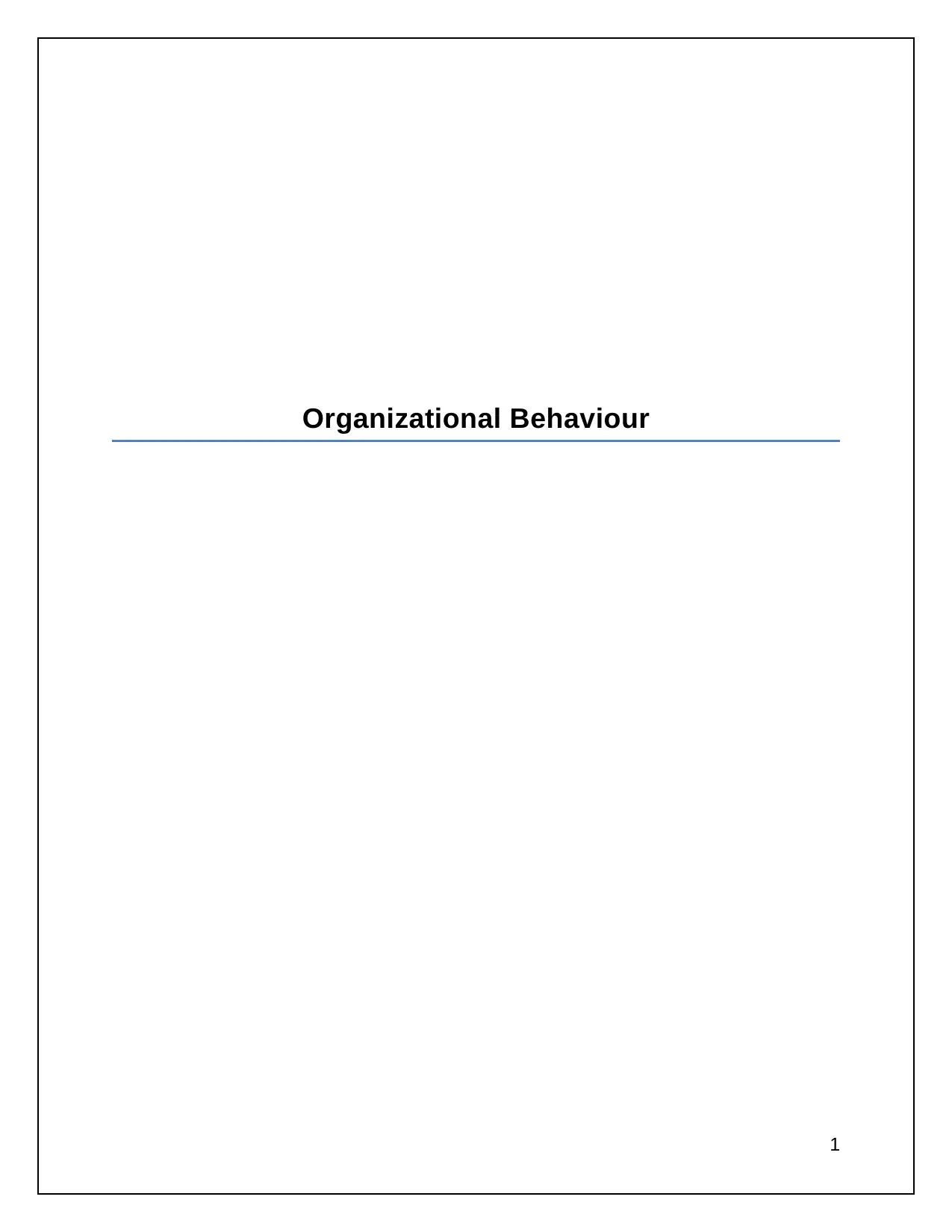
Organizational Behaviour
1
1
Paraphrase This Document
Need a fresh take? Get an instant paraphrase of this document with our AI Paraphraser
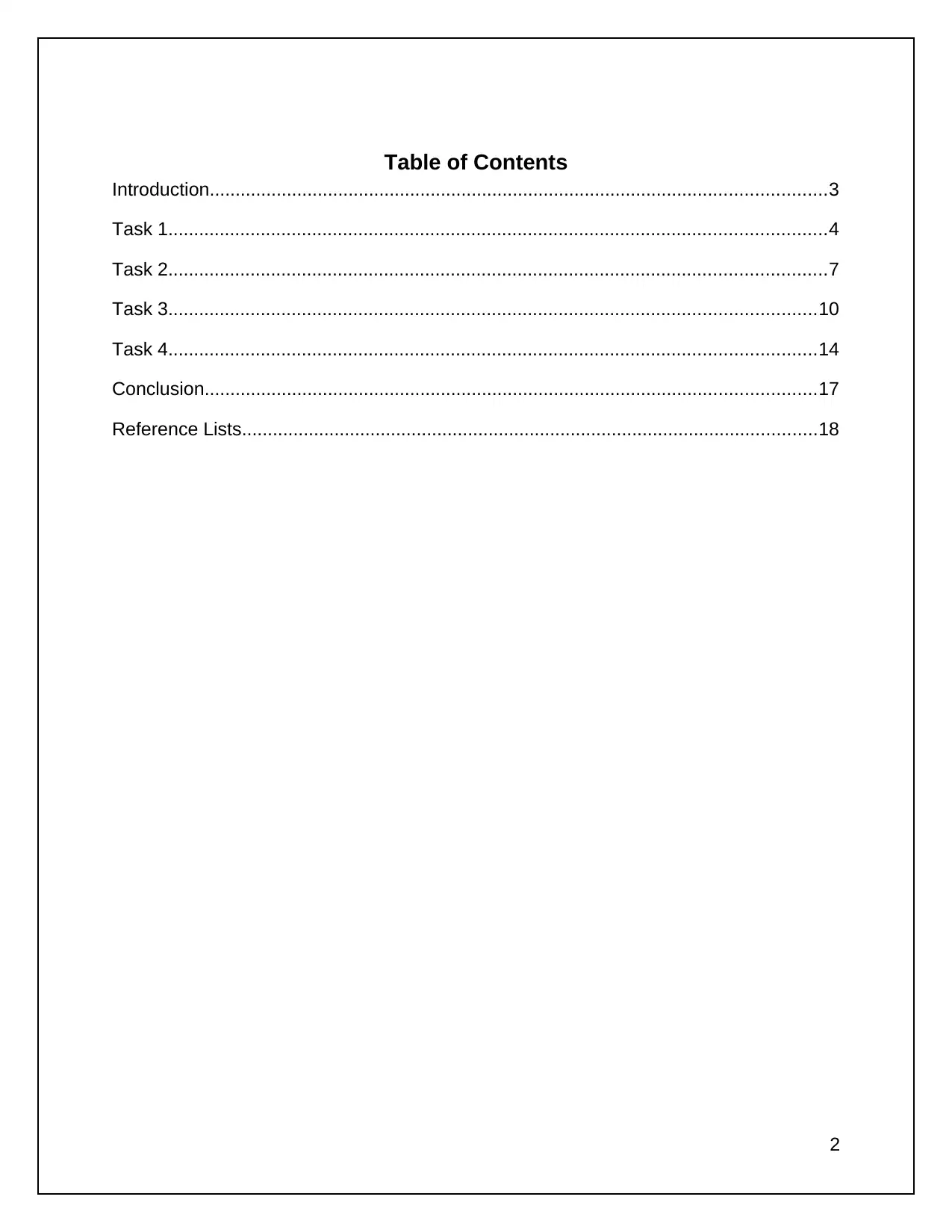
Table of Contents
Introduction........................................................................................................................3
Task 1................................................................................................................................4
Task 2................................................................................................................................7
Task 3..............................................................................................................................10
Task 4..............................................................................................................................14
Conclusion.......................................................................................................................17
Reference Lists................................................................................................................18
2
Introduction........................................................................................................................3
Task 1................................................................................................................................4
Task 2................................................................................................................................7
Task 3..............................................................................................................................10
Task 4..............................................................................................................................14
Conclusion.......................................................................................................................17
Reference Lists................................................................................................................18
2
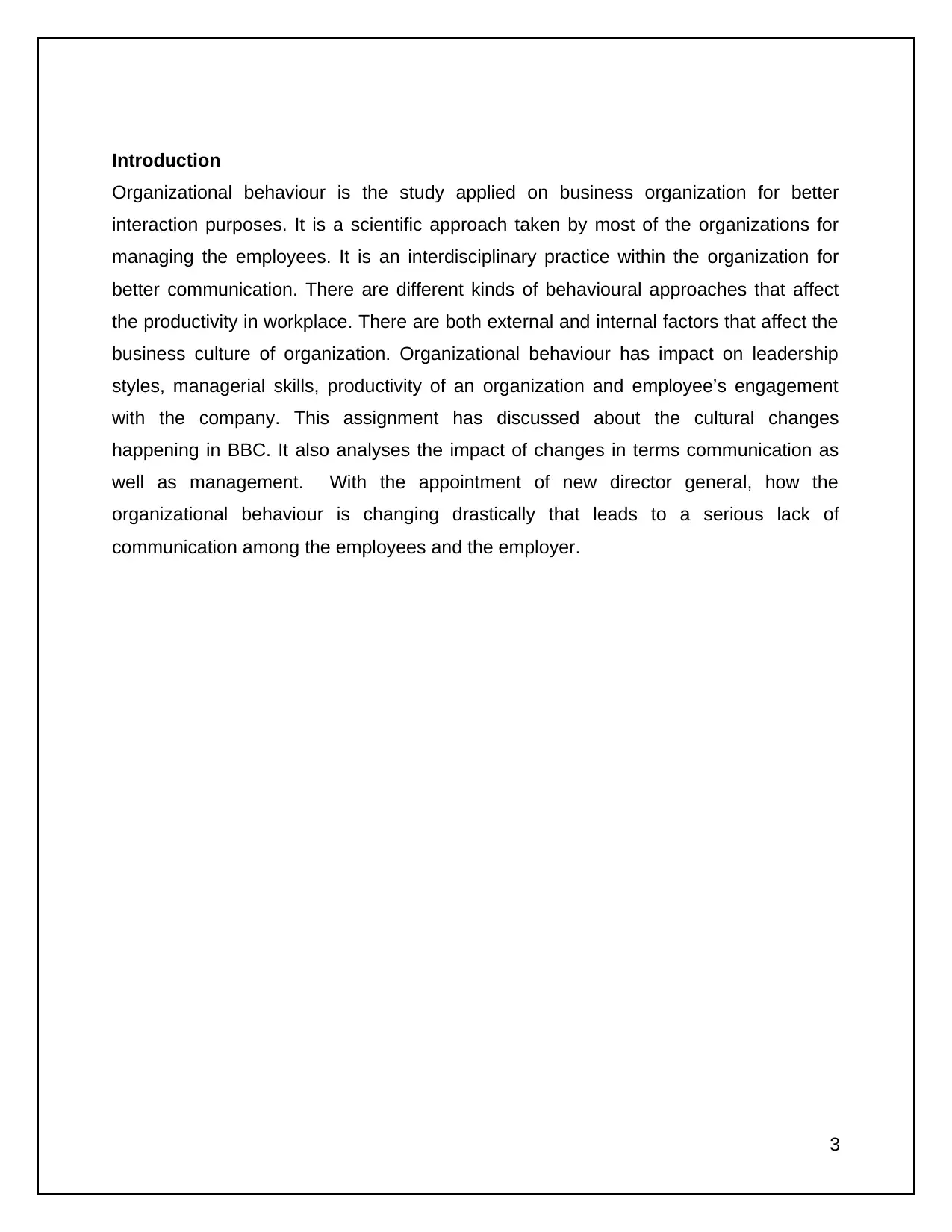
Introduction
Organizational behaviour is the study applied on business organization for better
interaction purposes. It is a scientific approach taken by most of the organizations for
managing the employees. It is an interdisciplinary practice within the organization for
better communication. There are different kinds of behavioural approaches that affect
the productivity in workplace. There are both external and internal factors that affect the
business culture of organization. Organizational behaviour has impact on leadership
styles, managerial skills, productivity of an organization and employee’s engagement
with the company. This assignment has discussed about the cultural changes
happening in BBC. It also analyses the impact of changes in terms communication as
well as management. With the appointment of new director general, how the
organizational behaviour is changing drastically that leads to a serious lack of
communication among the employees and the employer.
3
Organizational behaviour is the study applied on business organization for better
interaction purposes. It is a scientific approach taken by most of the organizations for
managing the employees. It is an interdisciplinary practice within the organization for
better communication. There are different kinds of behavioural approaches that affect
the productivity in workplace. There are both external and internal factors that affect the
business culture of organization. Organizational behaviour has impact on leadership
styles, managerial skills, productivity of an organization and employee’s engagement
with the company. This assignment has discussed about the cultural changes
happening in BBC. It also analyses the impact of changes in terms communication as
well as management. With the appointment of new director general, how the
organizational behaviour is changing drastically that leads to a serious lack of
communication among the employees and the employer.
3
⊘ This is a preview!⊘
Do you want full access?
Subscribe today to unlock all pages.

Trusted by 1+ million students worldwide
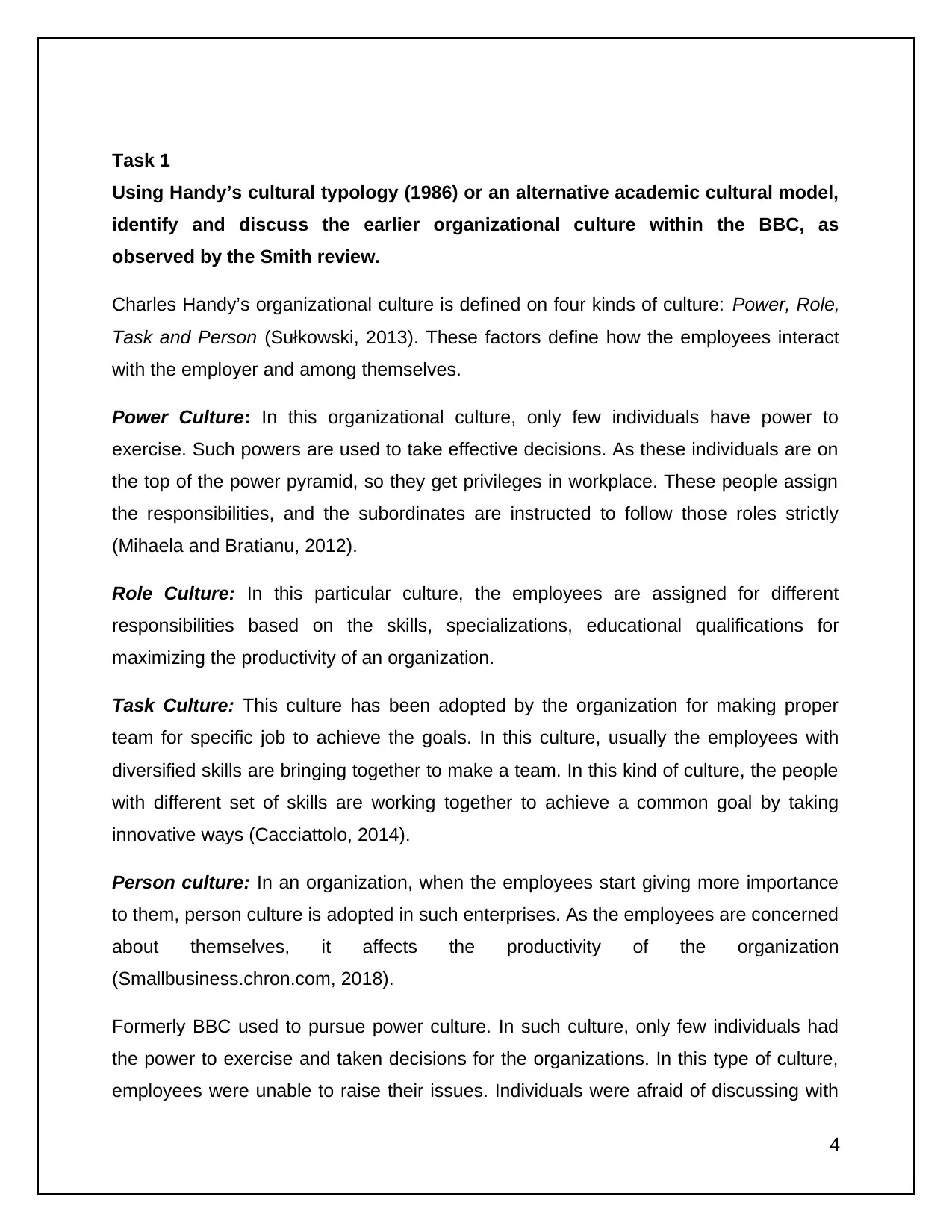
Task 1
Using Handy’s cultural typology (1986) or an alternative academic cultural model,
identify and discuss the earlier organizational culture within the BBC, as
observed by the Smith review.
Charles Handy’s organizational culture is defined on four kinds of culture: Power, Role,
Task and Person (Sułkowski, 2013). These factors define how the employees interact
with the employer and among themselves.
Power Culture: In this organizational culture, only few individuals have power to
exercise. Such powers are used to take effective decisions. As these individuals are on
the top of the power pyramid, so they get privileges in workplace. These people assign
the responsibilities, and the subordinates are instructed to follow those roles strictly
(Mihaela and Bratianu, 2012).
Role Culture: In this particular culture, the employees are assigned for different
responsibilities based on the skills, specializations, educational qualifications for
maximizing the productivity of an organization.
Task Culture: This culture has been adopted by the organization for making proper
team for specific job to achieve the goals. In this culture, usually the employees with
diversified skills are bringing together to make a team. In this kind of culture, the people
with different set of skills are working together to achieve a common goal by taking
innovative ways (Cacciattolo, 2014).
Person culture: In an organization, when the employees start giving more importance
to them, person culture is adopted in such enterprises. As the employees are concerned
about themselves, it affects the productivity of the organization
(Smallbusiness.chron.com, 2018).
Formerly BBC used to pursue power culture. In such culture, only few individuals had
the power to exercise and taken decisions for the organizations. In this type of culture,
employees were unable to raise their issues. Individuals were afraid of discussing with
4
Using Handy’s cultural typology (1986) or an alternative academic cultural model,
identify and discuss the earlier organizational culture within the BBC, as
observed by the Smith review.
Charles Handy’s organizational culture is defined on four kinds of culture: Power, Role,
Task and Person (Sułkowski, 2013). These factors define how the employees interact
with the employer and among themselves.
Power Culture: In this organizational culture, only few individuals have power to
exercise. Such powers are used to take effective decisions. As these individuals are on
the top of the power pyramid, so they get privileges in workplace. These people assign
the responsibilities, and the subordinates are instructed to follow those roles strictly
(Mihaela and Bratianu, 2012).
Role Culture: In this particular culture, the employees are assigned for different
responsibilities based on the skills, specializations, educational qualifications for
maximizing the productivity of an organization.
Task Culture: This culture has been adopted by the organization for making proper
team for specific job to achieve the goals. In this culture, usually the employees with
diversified skills are bringing together to make a team. In this kind of culture, the people
with different set of skills are working together to achieve a common goal by taking
innovative ways (Cacciattolo, 2014).
Person culture: In an organization, when the employees start giving more importance
to them, person culture is adopted in such enterprises. As the employees are concerned
about themselves, it affects the productivity of the organization
(Smallbusiness.chron.com, 2018).
Formerly BBC used to pursue power culture. In such culture, only few individuals had
the power to exercise and taken decisions for the organizations. In this type of culture,
employees were unable to raise their issues. Individuals were afraid of discussing with
4
Paraphrase This Document
Need a fresh take? Get an instant paraphrase of this document with our AI Paraphraser
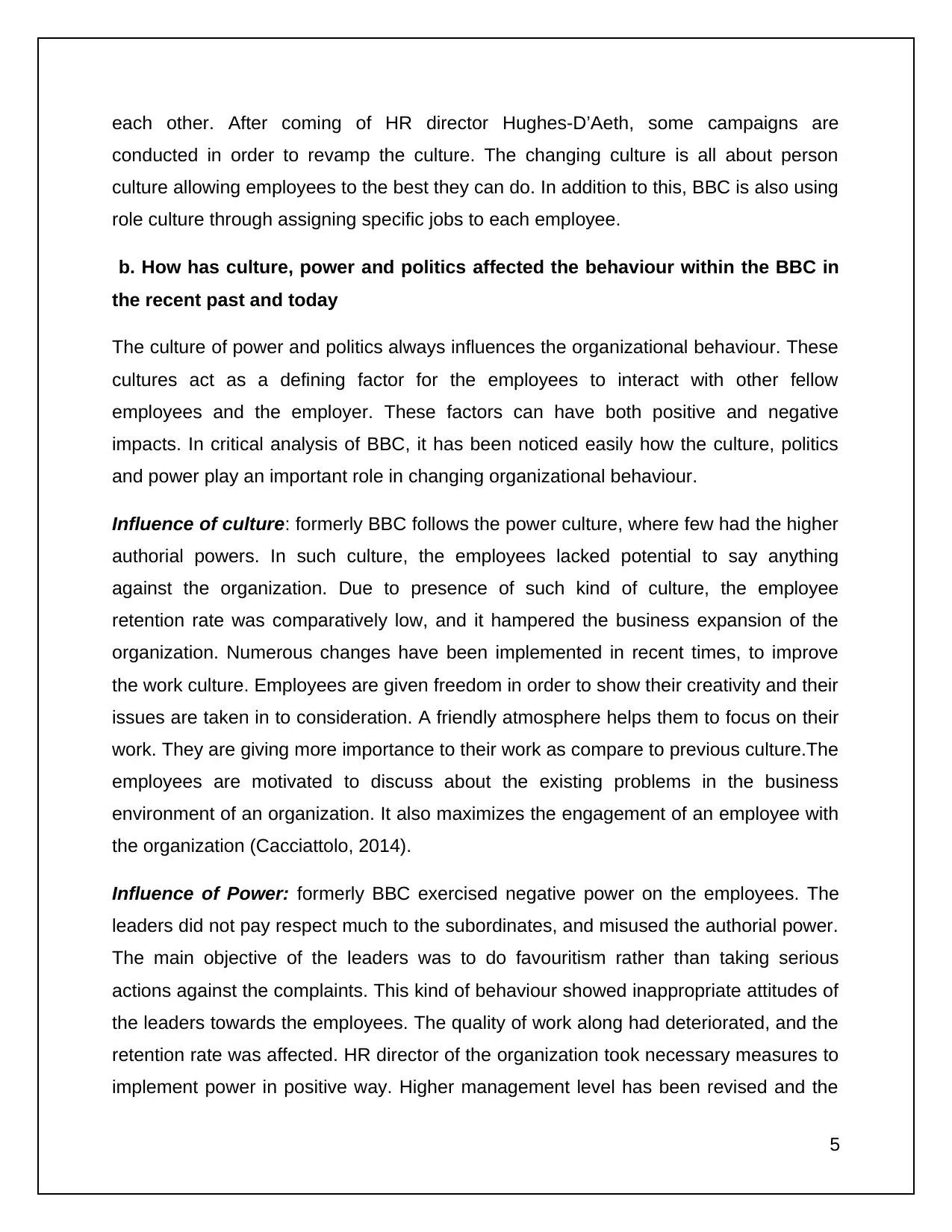
each other. After coming of HR director Hughes-D’Aeth, some campaigns are
conducted in order to revamp the culture. The changing culture is all about person
culture allowing employees to the best they can do. In addition to this, BBC is also using
role culture through assigning specific jobs to each employee.
b. How has culture, power and politics affected the behaviour within the BBC in
the recent past and today
The culture of power and politics always influences the organizational behaviour. These
cultures act as a defining factor for the employees to interact with other fellow
employees and the employer. These factors can have both positive and negative
impacts. In critical analysis of BBC, it has been noticed easily how the culture, politics
and power play an important role in changing organizational behaviour.
Influence of culture: formerly BBC follows the power culture, where few had the higher
authorial powers. In such culture, the employees lacked potential to say anything
against the organization. Due to presence of such kind of culture, the employee
retention rate was comparatively low, and it hampered the business expansion of the
organization. Numerous changes have been implemented in recent times, to improve
the work culture. Employees are given freedom in order to show their creativity and their
issues are taken in to consideration. A friendly atmosphere helps them to focus on their
work. They are giving more importance to their work as compare to previous culture.The
employees are motivated to discuss about the existing problems in the business
environment of an organization. It also maximizes the engagement of an employee with
the organization (Cacciattolo, 2014).
Influence of Power: formerly BBC exercised negative power on the employees. The
leaders did not pay respect much to the subordinates, and misused the authorial power.
The main objective of the leaders was to do favouritism rather than taking serious
actions against the complaints. This kind of behaviour showed inappropriate attitudes of
the leaders towards the employees. The quality of work along had deteriorated, and the
retention rate was affected. HR director of the organization took necessary measures to
implement power in positive way. Higher management level has been revised and the
5
conducted in order to revamp the culture. The changing culture is all about person
culture allowing employees to the best they can do. In addition to this, BBC is also using
role culture through assigning specific jobs to each employee.
b. How has culture, power and politics affected the behaviour within the BBC in
the recent past and today
The culture of power and politics always influences the organizational behaviour. These
cultures act as a defining factor for the employees to interact with other fellow
employees and the employer. These factors can have both positive and negative
impacts. In critical analysis of BBC, it has been noticed easily how the culture, politics
and power play an important role in changing organizational behaviour.
Influence of culture: formerly BBC follows the power culture, where few had the higher
authorial powers. In such culture, the employees lacked potential to say anything
against the organization. Due to presence of such kind of culture, the employee
retention rate was comparatively low, and it hampered the business expansion of the
organization. Numerous changes have been implemented in recent times, to improve
the work culture. Employees are given freedom in order to show their creativity and their
issues are taken in to consideration. A friendly atmosphere helps them to focus on their
work. They are giving more importance to their work as compare to previous culture.The
employees are motivated to discuss about the existing problems in the business
environment of an organization. It also maximizes the engagement of an employee with
the organization (Cacciattolo, 2014).
Influence of Power: formerly BBC exercised negative power on the employees. The
leaders did not pay respect much to the subordinates, and misused the authorial power.
The main objective of the leaders was to do favouritism rather than taking serious
actions against the complaints. This kind of behaviour showed inappropriate attitudes of
the leaders towards the employees. The quality of work along had deteriorated, and the
retention rate was affected. HR director of the organization took necessary measures to
implement power in positive way. Higher management level has been revised and the
5
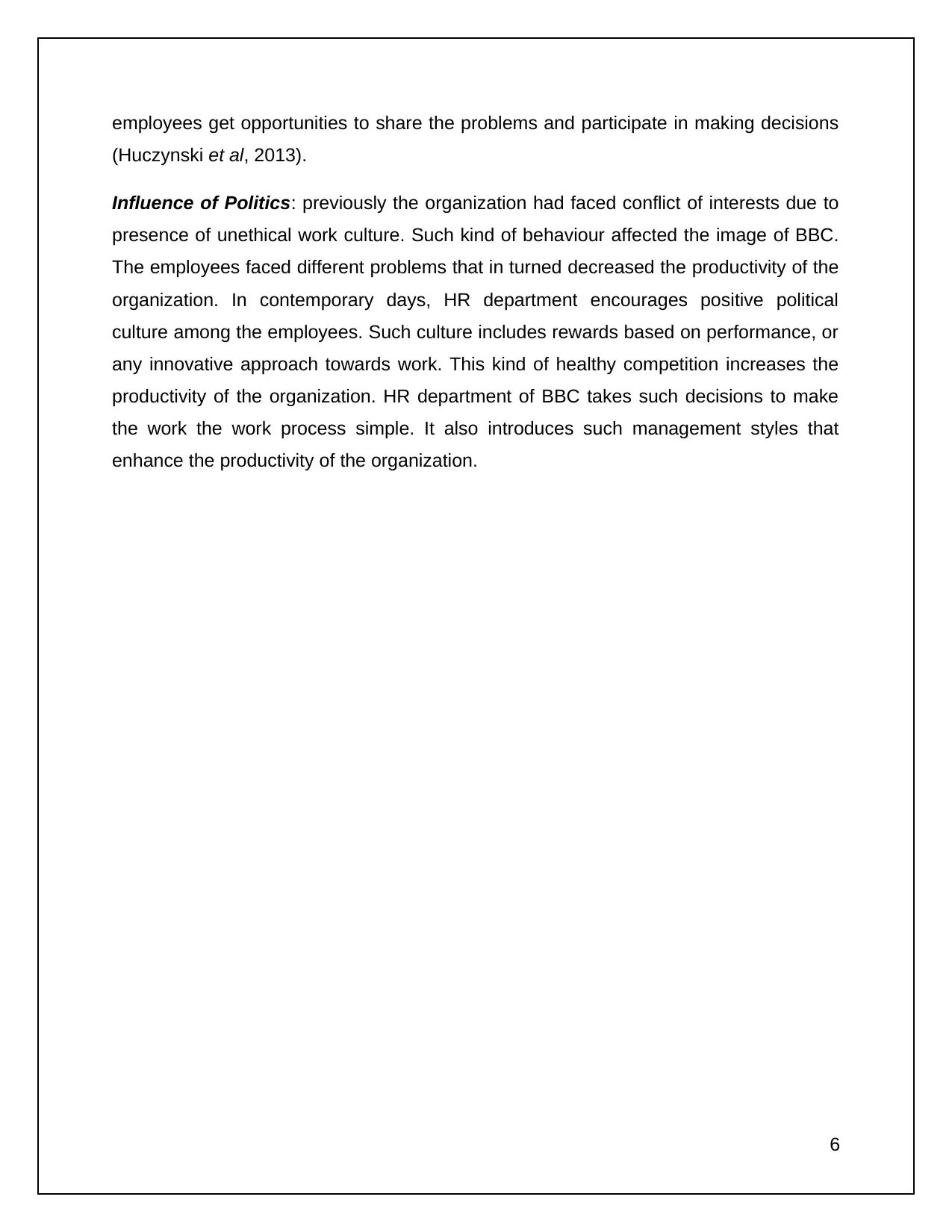
employees get opportunities to share the problems and participate in making decisions
(Huczynski et al, 2013).
Influence of Politics: previously the organization had faced conflict of interests due to
presence of unethical work culture. Such kind of behaviour affected the image of BBC.
The employees faced different problems that in turned decreased the productivity of the
organization. In contemporary days, HR department encourages positive political
culture among the employees. Such culture includes rewards based on performance, or
any innovative approach towards work. This kind of healthy competition increases the
productivity of the organization. HR department of BBC takes such decisions to make
the work the work process simple. It also introduces such management styles that
enhance the productivity of the organization.
6
(Huczynski et al, 2013).
Influence of Politics: previously the organization had faced conflict of interests due to
presence of unethical work culture. Such kind of behaviour affected the image of BBC.
The employees faced different problems that in turned decreased the productivity of the
organization. In contemporary days, HR department encourages positive political
culture among the employees. Such culture includes rewards based on performance, or
any innovative approach towards work. This kind of healthy competition increases the
productivity of the organization. HR department of BBC takes such decisions to make
the work the work process simple. It also introduces such management styles that
enhance the productivity of the organization.
6
⊘ This is a preview!⊘
Do you want full access?
Subscribe today to unlock all pages.

Trusted by 1+ million students worldwide
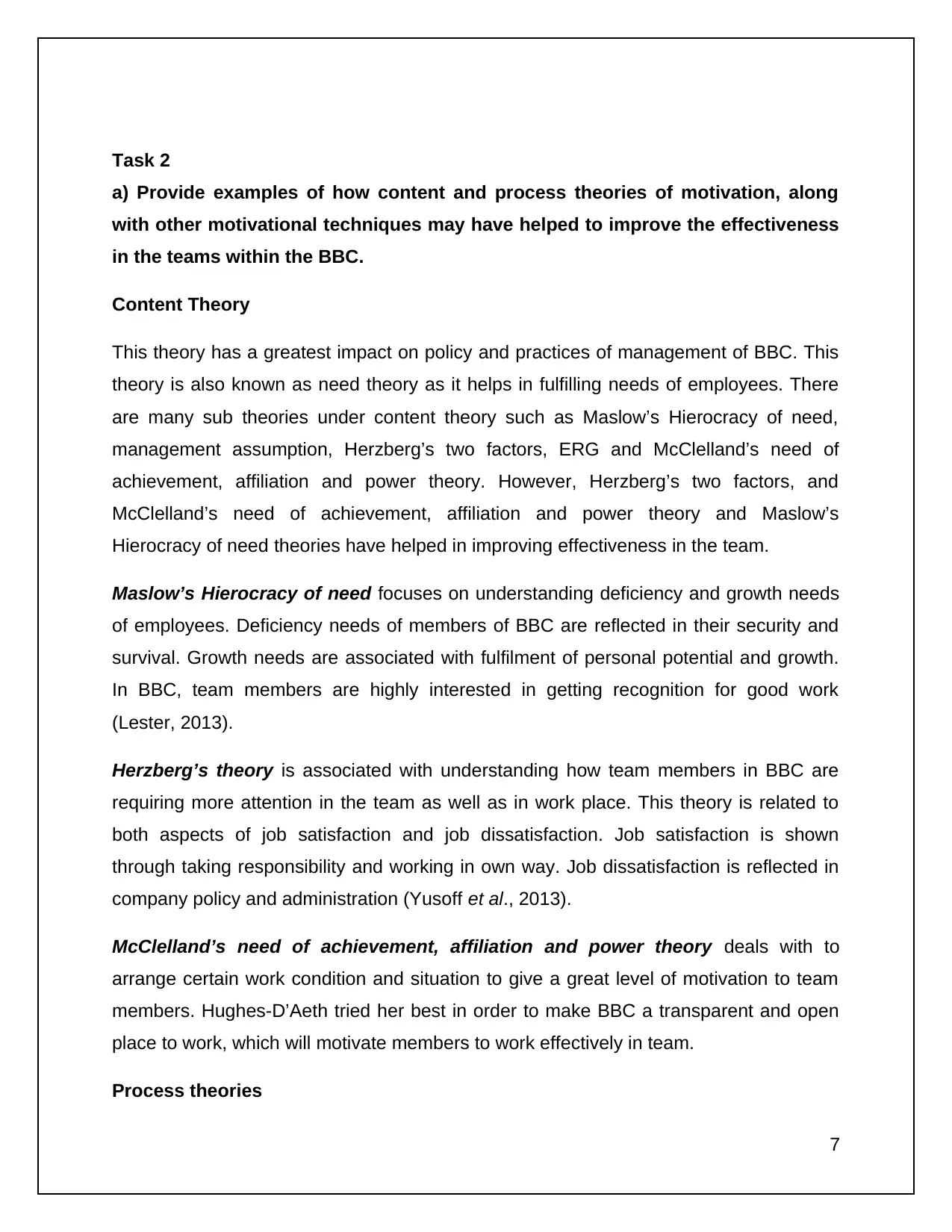
Task 2
a) Provide examples of how content and process theories of motivation, along
with other motivational techniques may have helped to improve the effectiveness
in the teams within the BBC.
Content Theory
This theory has a greatest impact on policy and practices of management of BBC. This
theory is also known as need theory as it helps in fulfilling needs of employees. There
are many sub theories under content theory such as Maslow’s Hierocracy of need,
management assumption, Herzberg’s two factors, ERG and McClelland’s need of
achievement, affiliation and power theory. However, Herzberg’s two factors, and
McClelland’s need of achievement, affiliation and power theory and Maslow’s
Hierocracy of need theories have helped in improving effectiveness in the team.
Maslow’s Hierocracy of need focuses on understanding deficiency and growth needs
of employees. Deficiency needs of members of BBC are reflected in their security and
survival. Growth needs are associated with fulfilment of personal potential and growth.
In BBC, team members are highly interested in getting recognition for good work
(Lester, 2013).
Herzberg’s theory is associated with understanding how team members in BBC are
requiring more attention in the team as well as in work place. This theory is related to
both aspects of job satisfaction and job dissatisfaction. Job satisfaction is shown
through taking responsibility and working in own way. Job dissatisfaction is reflected in
company policy and administration (Yusoff et al., 2013).
McClelland’s need of achievement, affiliation and power theory deals with to
arrange certain work condition and situation to give a great level of motivation to team
members. Hughes-D’Aeth tried her best in order to make BBC a transparent and open
place to work, which will motivate members to work effectively in team.
Process theories
7
a) Provide examples of how content and process theories of motivation, along
with other motivational techniques may have helped to improve the effectiveness
in the teams within the BBC.
Content Theory
This theory has a greatest impact on policy and practices of management of BBC. This
theory is also known as need theory as it helps in fulfilling needs of employees. There
are many sub theories under content theory such as Maslow’s Hierocracy of need,
management assumption, Herzberg’s two factors, ERG and McClelland’s need of
achievement, affiliation and power theory. However, Herzberg’s two factors, and
McClelland’s need of achievement, affiliation and power theory and Maslow’s
Hierocracy of need theories have helped in improving effectiveness in the team.
Maslow’s Hierocracy of need focuses on understanding deficiency and growth needs
of employees. Deficiency needs of members of BBC are reflected in their security and
survival. Growth needs are associated with fulfilment of personal potential and growth.
In BBC, team members are highly interested in getting recognition for good work
(Lester, 2013).
Herzberg’s theory is associated with understanding how team members in BBC are
requiring more attention in the team as well as in work place. This theory is related to
both aspects of job satisfaction and job dissatisfaction. Job satisfaction is shown
through taking responsibility and working in own way. Job dissatisfaction is reflected in
company policy and administration (Yusoff et al., 2013).
McClelland’s need of achievement, affiliation and power theory deals with to
arrange certain work condition and situation to give a great level of motivation to team
members. Hughes-D’Aeth tried her best in order to make BBC a transparent and open
place to work, which will motivate members to work effectively in team.
Process theories
7
Paraphrase This Document
Need a fresh take? Get an instant paraphrase of this document with our AI Paraphraser
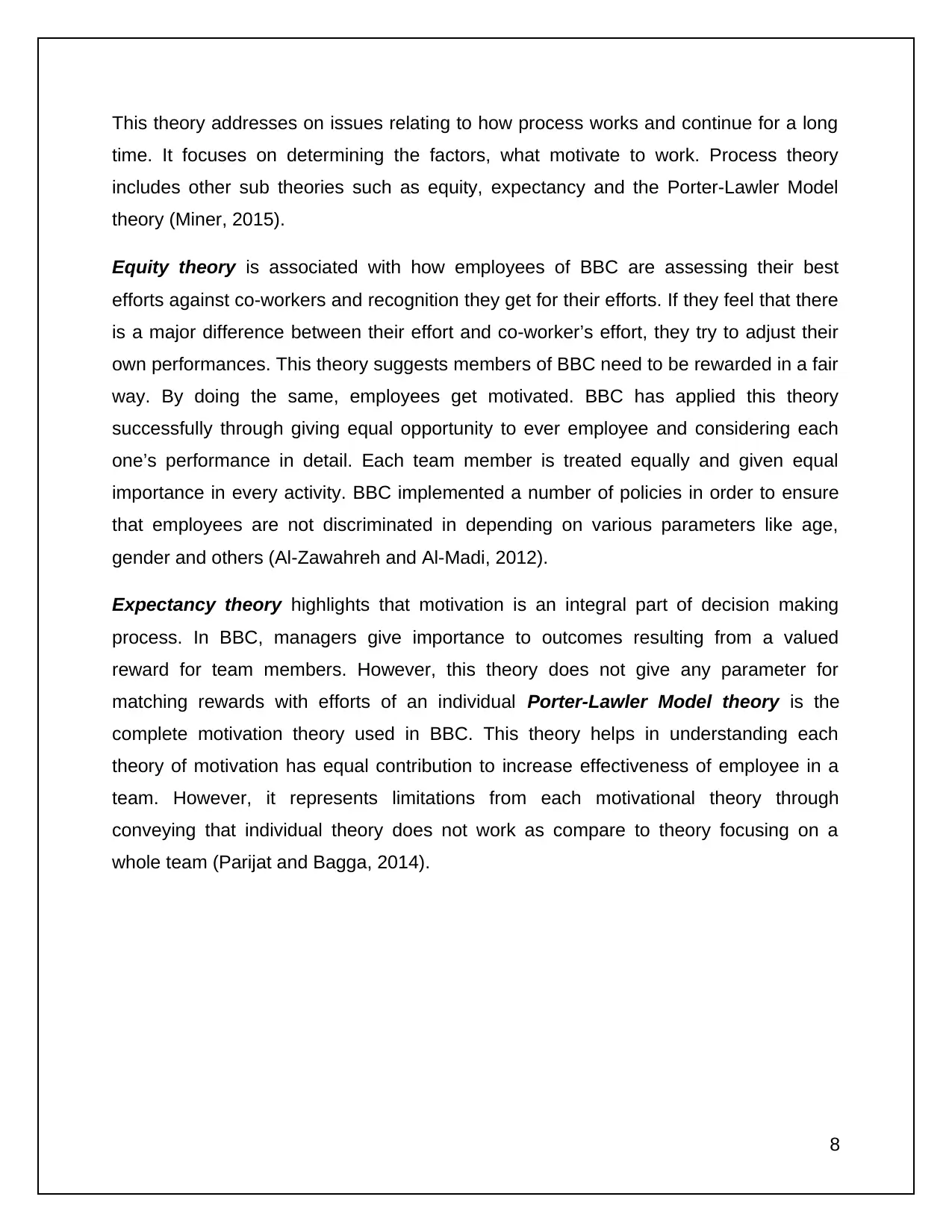
This theory addresses on issues relating to how process works and continue for a long
time. It focuses on determining the factors, what motivate to work. Process theory
includes other sub theories such as equity, expectancy and the Porter-Lawler Model
theory (Miner, 2015).
Equity theory is associated with how employees of BBC are assessing their best
efforts against co-workers and recognition they get for their efforts. If they feel that there
is a major difference between their effort and co-worker’s effort, they try to adjust their
own performances. This theory suggests members of BBC need to be rewarded in a fair
way. By doing the same, employees get motivated. BBC has applied this theory
successfully through giving equal opportunity to ever employee and considering each
one’s performance in detail. Each team member is treated equally and given equal
importance in every activity. BBC implemented a number of policies in order to ensure
that employees are not discriminated in depending on various parameters like age,
gender and others (Al-Zawahreh and Al-Madi, 2012).
Expectancy theory highlights that motivation is an integral part of decision making
process. In BBC, managers give importance to outcomes resulting from a valued
reward for team members. However, this theory does not give any parameter for
matching rewards with efforts of an individual Porter-Lawler Model theory is the
complete motivation theory used in BBC. This theory helps in understanding each
theory of motivation has equal contribution to increase effectiveness of employee in a
team. However, it represents limitations from each motivational theory through
conveying that individual theory does not work as compare to theory focusing on a
whole team (Parijat and Bagga, 2014).
8
time. It focuses on determining the factors, what motivate to work. Process theory
includes other sub theories such as equity, expectancy and the Porter-Lawler Model
theory (Miner, 2015).
Equity theory is associated with how employees of BBC are assessing their best
efforts against co-workers and recognition they get for their efforts. If they feel that there
is a major difference between their effort and co-worker’s effort, they try to adjust their
own performances. This theory suggests members of BBC need to be rewarded in a fair
way. By doing the same, employees get motivated. BBC has applied this theory
successfully through giving equal opportunity to ever employee and considering each
one’s performance in detail. Each team member is treated equally and given equal
importance in every activity. BBC implemented a number of policies in order to ensure
that employees are not discriminated in depending on various parameters like age,
gender and others (Al-Zawahreh and Al-Madi, 2012).
Expectancy theory highlights that motivation is an integral part of decision making
process. In BBC, managers give importance to outcomes resulting from a valued
reward for team members. However, this theory does not give any parameter for
matching rewards with efforts of an individual Porter-Lawler Model theory is the
complete motivation theory used in BBC. This theory helps in understanding each
theory of motivation has equal contribution to increase effectiveness of employee in a
team. However, it represents limitations from each motivational theory through
conveying that individual theory does not work as compare to theory focusing on a
whole team (Parijat and Bagga, 2014).
8
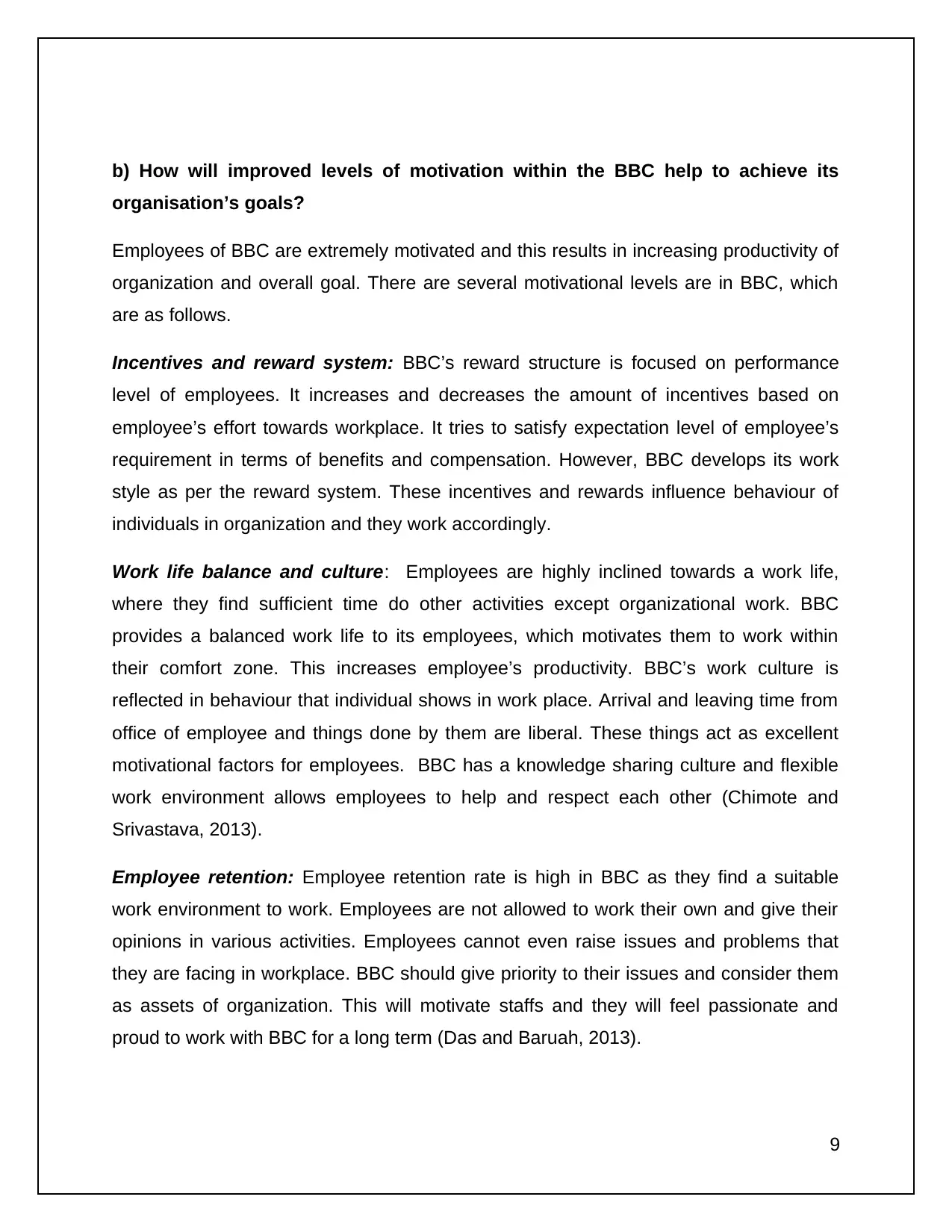
b) How will improved levels of motivation within the BBC help to achieve its
organisation’s goals?
Employees of BBC are extremely motivated and this results in increasing productivity of
organization and overall goal. There are several motivational levels are in BBC, which
are as follows.
Incentives and reward system: BBC’s reward structure is focused on performance
level of employees. It increases and decreases the amount of incentives based on
employee’s effort towards workplace. It tries to satisfy expectation level of employee’s
requirement in terms of benefits and compensation. However, BBC develops its work
style as per the reward system. These incentives and rewards influence behaviour of
individuals in organization and they work accordingly.
Work life balance and culture: Employees are highly inclined towards a work life,
where they find sufficient time do other activities except organizational work. BBC
provides a balanced work life to its employees, which motivates them to work within
their comfort zone. This increases employee’s productivity. BBC’s work culture is
reflected in behaviour that individual shows in work place. Arrival and leaving time from
office of employee and things done by them are liberal. These things act as excellent
motivational factors for employees. BBC has a knowledge sharing culture and flexible
work environment allows employees to help and respect each other (Chimote and
Srivastava, 2013).
Employee retention: Employee retention rate is high in BBC as they find a suitable
work environment to work. Employees are not allowed to work their own and give their
opinions in various activities. Employees cannot even raise issues and problems that
they are facing in workplace. BBC should give priority to their issues and consider them
as assets of organization. This will motivate staffs and they will feel passionate and
proud to work with BBC for a long term (Das and Baruah, 2013).
9
organisation’s goals?
Employees of BBC are extremely motivated and this results in increasing productivity of
organization and overall goal. There are several motivational levels are in BBC, which
are as follows.
Incentives and reward system: BBC’s reward structure is focused on performance
level of employees. It increases and decreases the amount of incentives based on
employee’s effort towards workplace. It tries to satisfy expectation level of employee’s
requirement in terms of benefits and compensation. However, BBC develops its work
style as per the reward system. These incentives and rewards influence behaviour of
individuals in organization and they work accordingly.
Work life balance and culture: Employees are highly inclined towards a work life,
where they find sufficient time do other activities except organizational work. BBC
provides a balanced work life to its employees, which motivates them to work within
their comfort zone. This increases employee’s productivity. BBC’s work culture is
reflected in behaviour that individual shows in work place. Arrival and leaving time from
office of employee and things done by them are liberal. These things act as excellent
motivational factors for employees. BBC has a knowledge sharing culture and flexible
work environment allows employees to help and respect each other (Chimote and
Srivastava, 2013).
Employee retention: Employee retention rate is high in BBC as they find a suitable
work environment to work. Employees are not allowed to work their own and give their
opinions in various activities. Employees cannot even raise issues and problems that
they are facing in workplace. BBC should give priority to their issues and consider them
as assets of organization. This will motivate staffs and they will feel passionate and
proud to work with BBC for a long term (Das and Baruah, 2013).
9
⊘ This is a preview!⊘
Do you want full access?
Subscribe today to unlock all pages.

Trusted by 1+ million students worldwide
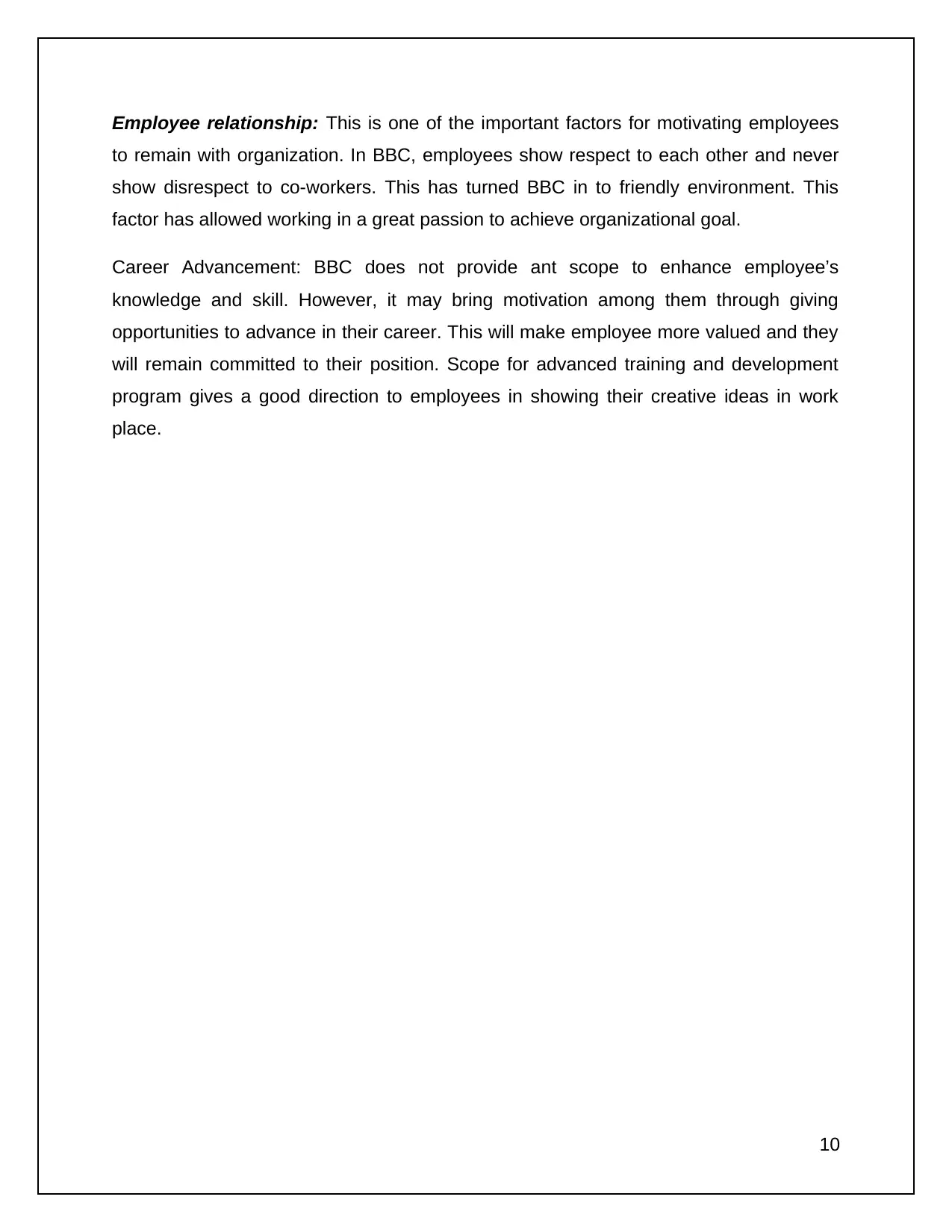
Employee relationship: This is one of the important factors for motivating employees
to remain with organization. In BBC, employees show respect to each other and never
show disrespect to co-workers. This has turned BBC in to friendly environment. This
factor has allowed working in a great passion to achieve organizational goal.
Career Advancement: BBC does not provide ant scope to enhance employee’s
knowledge and skill. However, it may bring motivation among them through giving
opportunities to advance in their career. This will make employee more valued and they
will remain committed to their position. Scope for advanced training and development
program gives a good direction to employees in showing their creative ideas in work
place.
10
to remain with organization. In BBC, employees show respect to each other and never
show disrespect to co-workers. This has turned BBC in to friendly environment. This
factor has allowed working in a great passion to achieve organizational goal.
Career Advancement: BBC does not provide ant scope to enhance employee’s
knowledge and skill. However, it may bring motivation among them through giving
opportunities to advance in their career. This will make employee more valued and they
will remain committed to their position. Scope for advanced training and development
program gives a good direction to employees in showing their creative ideas in work
place.
10
Paraphrase This Document
Need a fresh take? Get an instant paraphrase of this document with our AI Paraphraser
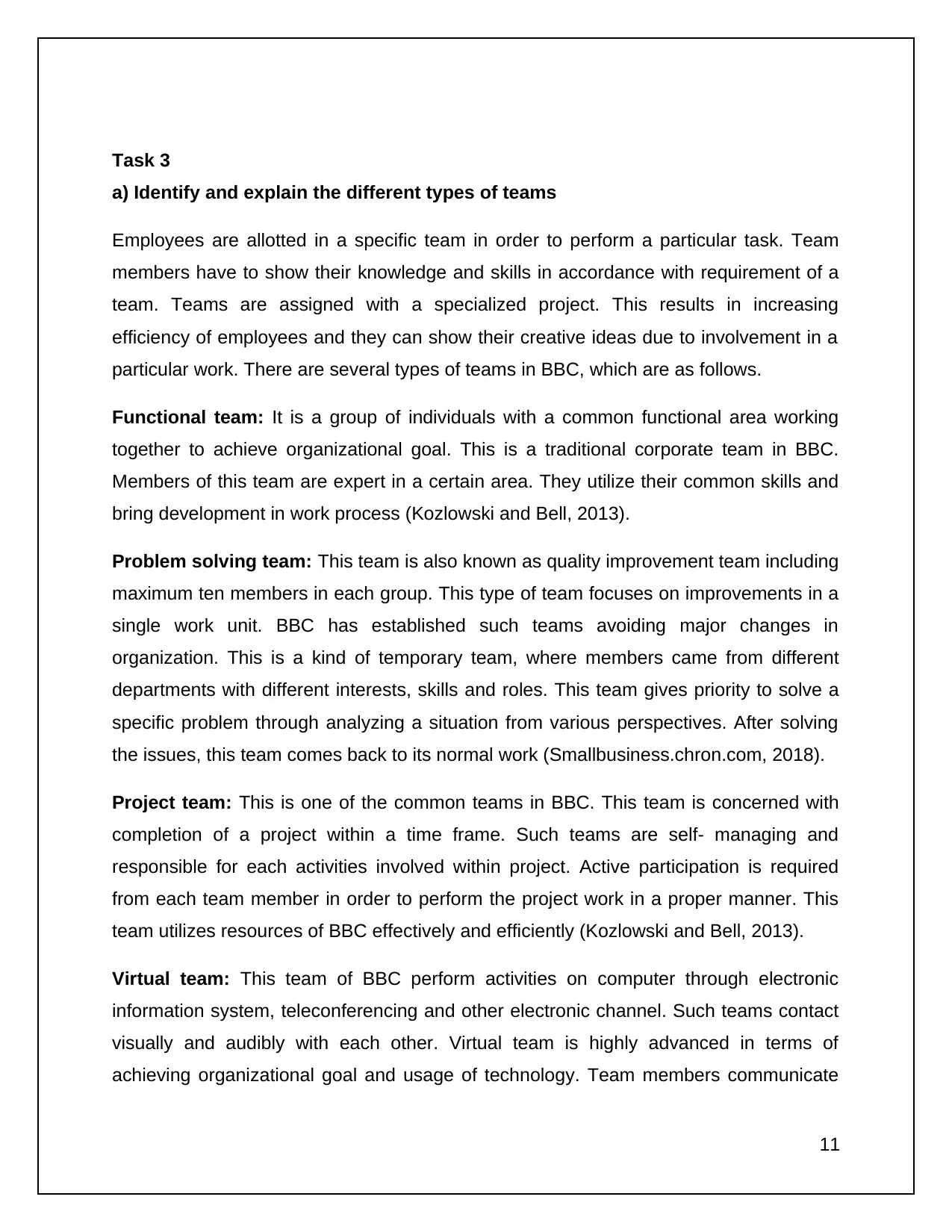
Task 3
a) Identify and explain the different types of teams
Employees are allotted in a specific team in order to perform a particular task. Team
members have to show their knowledge and skills in accordance with requirement of a
team. Teams are assigned with a specialized project. This results in increasing
efficiency of employees and they can show their creative ideas due to involvement in a
particular work. There are several types of teams in BBC, which are as follows.
Functional team: It is a group of individuals with a common functional area working
together to achieve organizational goal. This is a traditional corporate team in BBC.
Members of this team are expert in a certain area. They utilize their common skills and
bring development in work process (Kozlowski and Bell, 2013).
Problem solving team: This team is also known as quality improvement team including
maximum ten members in each group. This type of team focuses on improvements in a
single work unit. BBC has established such teams avoiding major changes in
organization. This is a kind of temporary team, where members came from different
departments with different interests, skills and roles. This team gives priority to solve a
specific problem through analyzing a situation from various perspectives. After solving
the issues, this team comes back to its normal work (Smallbusiness.chron.com, 2018).
Project team: This is one of the common teams in BBC. This team is concerned with
completion of a project within a time frame. Such teams are self- managing and
responsible for each activities involved within project. Active participation is required
from each team member in order to perform the project work in a proper manner. This
team utilizes resources of BBC effectively and efficiently (Kozlowski and Bell, 2013).
Virtual team: This team of BBC perform activities on computer through electronic
information system, teleconferencing and other electronic channel. Such teams contact
visually and audibly with each other. Virtual team is highly advanced in terms of
achieving organizational goal and usage of technology. Team members communicate
11
a) Identify and explain the different types of teams
Employees are allotted in a specific team in order to perform a particular task. Team
members have to show their knowledge and skills in accordance with requirement of a
team. Teams are assigned with a specialized project. This results in increasing
efficiency of employees and they can show their creative ideas due to involvement in a
particular work. There are several types of teams in BBC, which are as follows.
Functional team: It is a group of individuals with a common functional area working
together to achieve organizational goal. This is a traditional corporate team in BBC.
Members of this team are expert in a certain area. They utilize their common skills and
bring development in work process (Kozlowski and Bell, 2013).
Problem solving team: This team is also known as quality improvement team including
maximum ten members in each group. This type of team focuses on improvements in a
single work unit. BBC has established such teams avoiding major changes in
organization. This is a kind of temporary team, where members came from different
departments with different interests, skills and roles. This team gives priority to solve a
specific problem through analyzing a situation from various perspectives. After solving
the issues, this team comes back to its normal work (Smallbusiness.chron.com, 2018).
Project team: This is one of the common teams in BBC. This team is concerned with
completion of a project within a time frame. Such teams are self- managing and
responsible for each activities involved within project. Active participation is required
from each team member in order to perform the project work in a proper manner. This
team utilizes resources of BBC effectively and efficiently (Kozlowski and Bell, 2013).
Virtual team: This team of BBC perform activities on computer through electronic
information system, teleconferencing and other electronic channel. Such teams contact
visually and audibly with each other. Virtual team is highly advanced in terms of
achieving organizational goal and usage of technology. Team members communicate
11
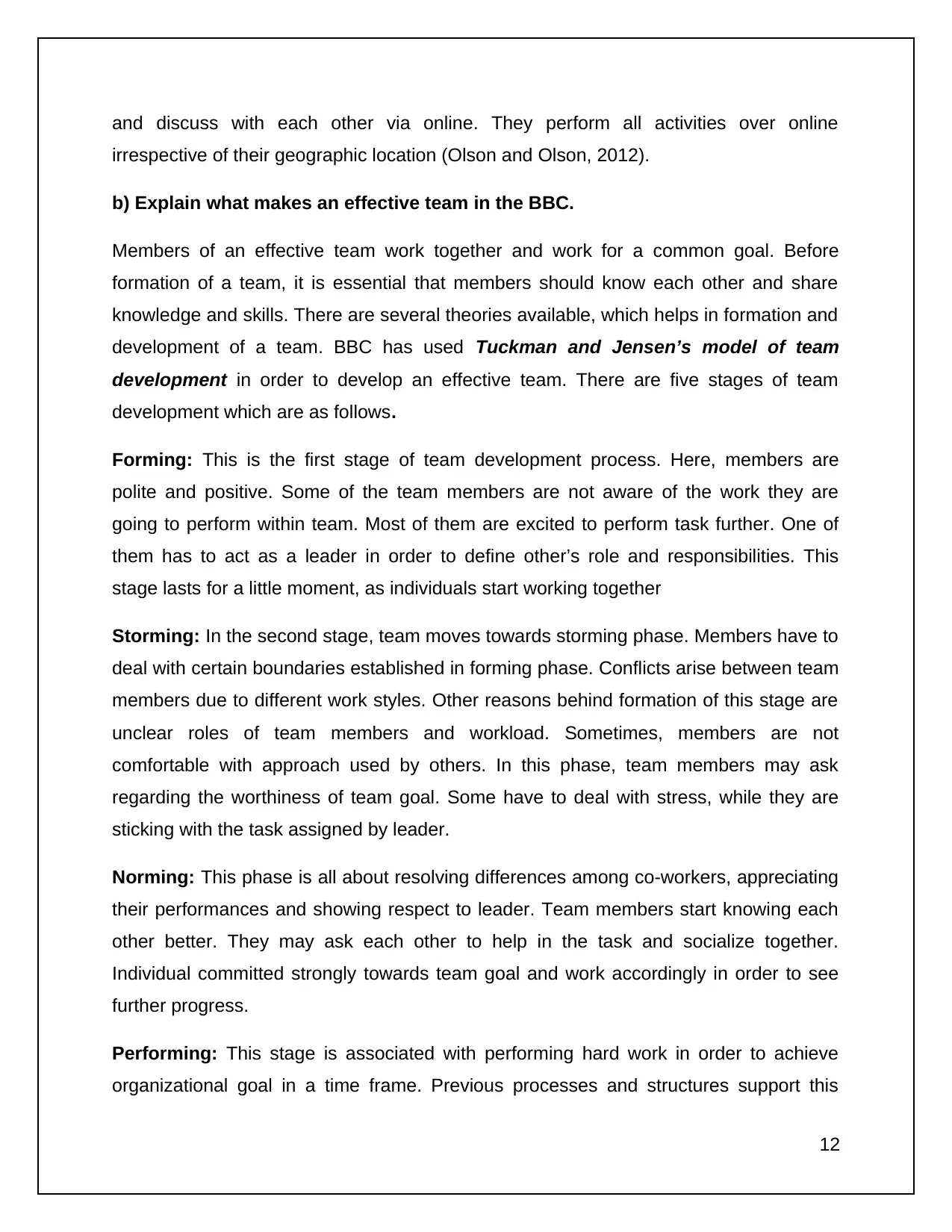
and discuss with each other via online. They perform all activities over online
irrespective of their geographic location (Olson and Olson, 2012).
b) Explain what makes an effective team in the BBC.
Members of an effective team work together and work for a common goal. Before
formation of a team, it is essential that members should know each other and share
knowledge and skills. There are several theories available, which helps in formation and
development of a team. BBC has used Tuckman and Jensen’s model of team
development in order to develop an effective team. There are five stages of team
development which are as follows.
Forming: This is the first stage of team development process. Here, members are
polite and positive. Some of the team members are not aware of the work they are
going to perform within team. Most of them are excited to perform task further. One of
them has to act as a leader in order to define other’s role and responsibilities. This
stage lasts for a little moment, as individuals start working together
Storming: In the second stage, team moves towards storming phase. Members have to
deal with certain boundaries established in forming phase. Conflicts arise between team
members due to different work styles. Other reasons behind formation of this stage are
unclear roles of team members and workload. Sometimes, members are not
comfortable with approach used by others. In this phase, team members may ask
regarding the worthiness of team goal. Some have to deal with stress, while they are
sticking with the task assigned by leader.
Norming: This phase is all about resolving differences among co-workers, appreciating
their performances and showing respect to leader. Team members start knowing each
other better. They may ask each other to help in the task and socialize together.
Individual committed strongly towards team goal and work accordingly in order to see
further progress.
Performing: This stage is associated with performing hard work in order to achieve
organizational goal in a time frame. Previous processes and structures support this
12
irrespective of their geographic location (Olson and Olson, 2012).
b) Explain what makes an effective team in the BBC.
Members of an effective team work together and work for a common goal. Before
formation of a team, it is essential that members should know each other and share
knowledge and skills. There are several theories available, which helps in formation and
development of a team. BBC has used Tuckman and Jensen’s model of team
development in order to develop an effective team. There are five stages of team
development which are as follows.
Forming: This is the first stage of team development process. Here, members are
polite and positive. Some of the team members are not aware of the work they are
going to perform within team. Most of them are excited to perform task further. One of
them has to act as a leader in order to define other’s role and responsibilities. This
stage lasts for a little moment, as individuals start working together
Storming: In the second stage, team moves towards storming phase. Members have to
deal with certain boundaries established in forming phase. Conflicts arise between team
members due to different work styles. Other reasons behind formation of this stage are
unclear roles of team members and workload. Sometimes, members are not
comfortable with approach used by others. In this phase, team members may ask
regarding the worthiness of team goal. Some have to deal with stress, while they are
sticking with the task assigned by leader.
Norming: This phase is all about resolving differences among co-workers, appreciating
their performances and showing respect to leader. Team members start knowing each
other better. They may ask each other to help in the task and socialize together.
Individual committed strongly towards team goal and work accordingly in order to see
further progress.
Performing: This stage is associated with performing hard work in order to achieve
organizational goal in a time frame. Previous processes and structures support this
12
⊘ This is a preview!⊘
Do you want full access?
Subscribe today to unlock all pages.

Trusted by 1+ million students worldwide
1 out of 19
Related Documents
Your All-in-One AI-Powered Toolkit for Academic Success.
+13062052269
info@desklib.com
Available 24*7 on WhatsApp / Email
![[object Object]](/_next/static/media/star-bottom.7253800d.svg)
Unlock your academic potential
Copyright © 2020–2026 A2Z Services. All Rights Reserved. Developed and managed by ZUCOL.





